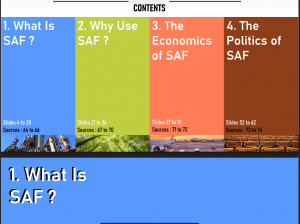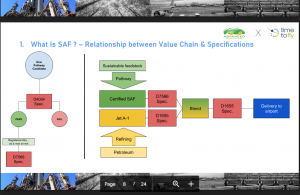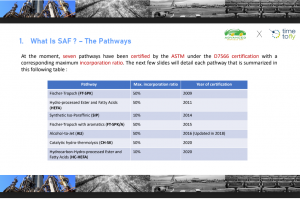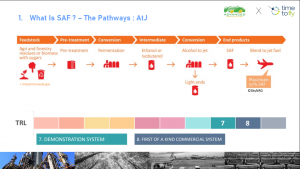by Gaulthier Blangez* (Time to Fly and Advanced Biofuels USA) Advanced Biofuels USA, in collaboration with Time to Fly, is proud to publish a guide to sustainable aviation fuels (SAF) for a general audience, for corporations working on ESG (environment, social and governance) efforts, as well as for potential investors.
 This project started when we realized the gap between amount of understanding the general public has about SAF and the important potential it holds to mitigate climate change. SAF usage is key to adapting to the climate crisis we are all facing as individuals, communities, companies or institutions.
This project started when we realized the gap between amount of understanding the general public has about SAF and the important potential it holds to mitigate climate change. SAF usage is key to adapting to the climate crisis we are all facing as individuals, communities, companies or institutions.
We believe that the first step for a technology to spread is to make it easy to understand. That’s even more the case for aviation: an industry which is hard to defossilize while being massively used by a large spectrum of consumers.
Therefore, this four-part guide is built around the idea of making something that could be perfect for a curious teenager to understand. Though, while key concepts are all depicted in one place and simply explained, we added a technical layer to match the needs of professionals who need to understand, quickly, what SAF is about.
It answers key questions and shines light on key topics: What is SAF? Why use SAF? The Economics of SAF. The Politics of SAF.
This first installment focuses on the ways that SAF is made and explains the international framework and assessment for SAF development from a variety of processes (pathways) using a multitude of feedstocks.
Future installments will highlight why and how SAF is used and will explore some related policy and economic issues.
Background
I was born in a generation raised in the aftermath of Norwegian Prime Minister Gro Harlem Brundtland’s pledge for “our common future”.. I learned how central the notion of “sustainable development” is, as did all the people of my age.
Nevertheless, I also experienced how crucial aviation was as a way to bring together spread-apart families, overseas students, or as means to reach multiple cultures, and to provide crucial services such as medical evacuations or humanitarian help. Therefore, I believe that sobriety and innovation should be seen as complementary. Our work with this guide goes in that direction.
 PART 1
PART 1
The first part of this four-part presentation is about the definition of SAF. Meaning that you’ll get to learn how primary feedstock is transformed into SAF and how the final product is approved for usage.
Beyond the semantical questions raised by this topic such as “What’s the correct word for this production pathway?” or “Should we talk about SAF as a plural?” are the core concepts: technical certification, production pathways and dedicated feedstock.
And there we have our starting point: SAF is jet-fuel without the fuel. Well, almost without the fuel, so far. Confused? Let me guide you through that statement.
First, “SAF is jet-fuel”. It means that SAF has the same chemistry properties as jet-fuel (and in most cases to jet A1 specifically). Therefore, using SAF should be transparent in a jet A1-oriented ecosystem. Think of it as blending water with water: [SPOILER] The end result would probably be water.
 It opens up the field of what is possible: since SAF is "drop-in" jet fuel, it can be distributed with jet fuel and there’s no need for a new supply chain. In a world where what pollutes less is what isn’t produced, we’re holding to something here. But it goes even further: since SAF is jet fuel, it can be used in the very same engines as jet fuel. So the supply line isn’t the only thing that doesn’t need to be replaced or upgraded: SAF has been compatible with aircrafts for as long as jet A1 has been.
It opens up the field of what is possible: since SAF is "drop-in" jet fuel, it can be distributed with jet fuel and there’s no need for a new supply chain. In a world where what pollutes less is what isn’t produced, we’re holding to something here. But it goes even further: since SAF is jet fuel, it can be used in the very same engines as jet fuel. So the supply line isn’t the only thing that doesn’t need to be replaced or upgraded: SAF has been compatible with aircrafts for as long as jet A1 has been.
Second, “almost without the fuel“. This sentence refers to the SAF blending. And this is the point where I could lose you so I’ll clarify one or two things. By talking about SAF as a concept, I could be talking about one of two kinds of SAF: the neat SAF and the blended SAF and hear me out because this is crucial to your understanding.
Neat SAF is the renewable part of the blended SAF while the end product, blended SAF, is a blend of neat SAF and petroleum jet A1. The maximum proportion of neat SAF that can be blended with jet A1 is called the max blending ratio. Studies are ongoing to raise the max blending ratio to the 100% SAF target.
 Well, we just described in two points what the technical certification is: it is the certification that the usage of a specific production pathway would allow to obtain SAF, which is the same as jet A1 for all the reasons previously cited. In addition, the certification is valid for a given max blending ratio. Therefore each production pathway is linked to its specific max blend ratio.
Well, we just described in two points what the technical certification is: it is the certification that the usage of a specific production pathway would allow to obtain SAF, which is the same as jet A1 for all the reasons previously cited. In addition, the certification is valid for a given max blending ratio. Therefore each production pathway is linked to its specific max blend ratio.
Discover more about what SAF is, about the variety of production pathways and the feedstocks for each of them in this presentation.
Next time, we will explain why SAF makes sense in the aviation industry's quest for sustainability. READ MORE Download presentation
*Gaulthier Blangez has a Masters degree in Energy and Environment Economics from the French Institute of Petroleum and New Energies and works as a sustainable aviation fuels consultant with Time to Fly, a firm which guides actors in the aviation world with their operational management.

Related articles
- Sustainable Aviation Fuels: Parts 1-4: What Is SAF? Why Use SAF? Economics of SAF. Politics of SAF. (Advanced Biofuels USA/Time to Fly)
- SAF 201 – Digging a Bit Deeper into Sustainable Aviation Fuel (Stillwater Associates)
Nearly 55,000 articles in our online library!
Use the categories and tags listed below to access the nearly 50,000 articles indexed on this website.
Advanced Biofuels USA Policy Statements and Handouts!
- For Kids: Carbon Cycle Puzzle Page
- Why Ethanol? Why E85?
- Just A Minute 3-5 Minute Educational Videos
- 30/30 Online Presentations
- “Disappearing” Carbon Tax for Non-Renewable Fuels
- What’s the Difference between Biodiesel and Renewable (Green) Diesel? 2020 revision
- How to De-Fossilize Your Fleet: Suggestions for Fleet Managers Working on Sustainability Programs
- New Engine Technologies Could Produce Similar Mileage for All Ethanol Fuel Mixtures
- Action Plan for a Sustainable Advanced Biofuel Economy
- The Interaction of the Clean Air Act, California’s CAA Waiver, Corporate Average Fuel Economy Standards, Renewable Fuel Standards and California’s Low Carbon Fuel Standard
- Latest Data on Fuel Mileage and GHG Benefits of E30
- What Can I Do?
Donate
DonateARCHIVES
- February 2026
- January 2026
- December 2025
- November 2025
- October 2025
- September 2025
- August 2025
- July 2025
- June 2025
- May 2025
- April 2025
- March 2025
- February 2025
- January 2025
- December 2024
- November 2024
- October 2024
- September 2024
- August 2024
- July 2024
- June 2024
- May 2024
- April 2024
- March 2024
- February 2024
- January 2024
- December 2023
- November 2023
- October 2023
- September 2023
- August 2023
- July 2023
- June 2023
- May 2023
- April 2023
- March 2023
- February 2023
- January 2023
- December 2022
- November 2022
- October 2022
- September 2022
- August 2022
- July 2022
- June 2022
- May 2022
- April 2022
- March 2022
- February 2022
- January 2022
- December 2021
- November 2021
- October 2021
- September 2021
- August 2021
- July 2021
- June 2021
- May 2021
- April 2021
- March 2021
- February 2021
- January 2021
- December 2020
- November 2020
- October 2020
- September 2020
- August 2020
- July 2020
- June 2020
- May 2020
- April 2020
- March 2020
- February 2020
- January 2020
- December 2019
- November 2019
- October 2019
- September 2019
- August 2019
- July 2019
- June 2019
- May 2019
- April 2019
- March 2019
- February 2019
- January 2019
- December 2018
- November 2018
- October 2018
- September 2018
- August 2018
- July 2018
- June 2018
- May 2018
- April 2018
- March 2018
- February 2018
- January 2018
- December 2017
- November 2017
- October 2017
- September 2017
- August 2017
- July 2017
- June 2017
- May 2017
- April 2017
- March 2017
- February 2017
- January 2017
- December 2016
- November 2016
- October 2016
- September 2016
- August 2016
- July 2016
- June 2016
- May 2016
- April 2016
- March 2016
- February 2016
- January 2016
- December 2015
- November 2015
- October 2015
- September 2015
- August 2015
- July 2015
- June 2015
- May 2015
- April 2015
- March 2015
- February 2015
- January 2015
- December 2014
- November 2014
- October 2014
- September 2014
- August 2014
- July 2014
- June 2014
- May 2014
- April 2014
- March 2014
- February 2014
- January 2014
- December 2013
- November 2013
- October 2013
- September 2013
- August 2013
- July 2013
- June 2013
- May 2013
- April 2013
- March 2013
- February 2013
- January 2013
- December 2012
- November 2012
- October 2012
- September 2012
- August 2012
- July 2012
- June 2012
- May 2012
- April 2012
- March 2012
- February 2012
- January 2012
- December 2011
- November 2011
- October 2011
- September 2011
- August 2011
- July 2011
- June 2011
- May 2011
- April 2011
- March 2011
- February 2011
- January 2011
- December 2010
- November 2010
- October 2010
- September 2010
- August 2010
- July 2010
- June 2010
- May 2010
- April 2010
- March 2010
- February 2010
- January 2010
- December 2009
- November 2009
- October 2009
- September 2009
- August 2009
- July 2009
- June 2009
- May 2009
- April 2009
- March 2009
- February 2009
- January 2009
- December 2008
- November 2008
- October 2008
- September 2008
- August 2008
- July 2008
- June 2008
- May 2008
- April 2008
- March 2008
- February 2008
- January 2008
- December 2007
- November 2007
- October 2007
- September 2007
- August 2007
- June 2007
- February 2007
- January 2007
- October 2006
- April 2006
- January 2006
- April 2005
- December 2004
- November 2004
- December 1987
CATEGORIES
- About Us
- Advanced Biofuels Call to Action
- Aviation Fuel/Sustainable Aviation Fuel (SAF)
- BioChemicals/Renewable Chemicals
- BioRefineries/Renewable Fuel Production
- Business News/Analysis
- Cooking Fuel
- Education
- 30/30 Online Presentations
- Competitions, Contests
- Earth Day 2021
- Earth Day 2022
- Earth Day 2023
- Earth Day 2024
- Earth Day 2025
- Executive Training
- Featured Study Programs
- Instagram TikTok Short Videos
- Internships
- Just a Minute
- K-12 Activities
- Mechanics training
- Online Courses
- Podcasts
- Scholarships/Fellowships
- Teacher Resources
- Technical Training
- Technician Training
- University/College Programs
- Events
- Coming Events
- Completed Events
- More Coming Events
- Requests for Speakers, Presentations, Posters
- Requests for Speakers, Presentations, Posters Completed
- Webinars/Online
- Webinars/Online Completed; often available on-demand
- Federal Agency/Executive Branch
- Agency for International Development (USAID)
- Agriculture (USDA)
- Commerce Department
- Commodity Futures Trading Commission
- Congressional Budget Office
- Defense (DOD)
- Air Force
- Army
- DARPA (Defense Advance Research Projects Agency)
- Defense Logistics Agency
- Marines
- Navy
- Education Department
- Energy (DOE)
- Environmental Protection Agency
- Federal Energy Regulatory Commission (FERC)
- Federal Reserve System
- Federal Trade Commission
- Food and Drug Administration
- General Services Administration
- Government Accountability Office (GAO)
- Health and Human Services (HHS)
- Homeland Security
- Housing and Urban Development (HUD)
- Interior Department
- International Trade Commission
- Joint Office of Energy and Transportation
- Justice (DOJ)
- Labor Department
- National Academies of Sciences Engineering Medicine
- National Aeronautics and Space Administration
- National Oceanic and Atmospheric Administration
- National Research Council
- National Science Foundation
- National Transportation Safety Board (NTSB)
- Occupational Safety and Health Administration
- Overseas Private Investment Corporation
- Patent and Trademark Office
- Securities and Exchange Commission
- State Department
- Surface Transportation Board
- Transportation (DOT)
- Federal Aviation Administration
- National Highway Traffic Safety Administration (NHTSA)
- Pipeline and Hazardous Materials Safety Admin (PHMSA)
- Treasury Department
- U.S. Trade Representative (USTR)
- White House
- Federal Legislation
- Federal Litigation
- Federal Regulation
- Feedstocks
- Agriculture/Food Processing Residues nonfield crop
- Alcohol/Ethanol/Isobutanol
- Algae/Other Aquatic Organisms/Seaweed
- Atmosphere
- Carbon Dioxide (CO2)
- Field/Orchard/Plantation Crops/Residues
- Forestry/Wood/Residues/Waste
- hydrogen
- Manure
- Methane/Biogas
- methanol/bio-/renewable methanol
- Not Agriculture
- RFNBO (Renewable Fuels of Non-Biological Origin)
- Seawater
- Sugars
- water
- Funding/Financing/Investing
- grants
- Green Jobs
- Green Racing
- Health Concerns/Benefits
- Heating Oil/Fuel
- History of Advanced Biofuels
- Infrastructure
- Aggregation
- Biofuels Engine Design
- Biorefinery/Fuel Production Infrastructure
- Carbon Capture/Storage/Use
- certification
- Deliver Dispense
- Farming/Growing
- Precursors/Biointermediates
- Preprocessing
- Pretreatment
- Terminals Transport Pipelines
- International
- Abu Dhabi
- Afghanistan
- Africa
- Albania
- Algeria
- Angola
- Antarctica
- Arctic
- Argentina
- Armenia
- Aruba
- Asia
- Asia Pacific
- Australia
- Austria
- Azerbaijan
- Bahamas
- Bahrain
- Bangladesh
- Barbados
- Belarus
- Belgium
- Belize
- Benin
- Bermuda
- Bhutan
- Bolivia
- Bosnia and Herzegovina
- Botswana
- Brazil
- Brunei
- Bulgaria
- Burkina Faso
- Burundi
- Cambodia
- Cameroon
- Canada
- Canary Islands
- Caribbean
- Central African Republic
- Central America
- Chad
- Chile
- China
- Colombia
- Congo
- Congo, Democratic Republic of
- Costa Rica
- Croatia
- Cuba
- Cyprus
- Czech Republic
- Denmark
- Dominican Republic
- Dubai
- Ecuador
- Egypt
- El Salvador
- Equatorial Guinea
- Estonia
- Eswatini/Swaziland
- Ethiopia
- European Union (EU)
- Fiji
- Finland
- France
- French Guiana
- Gabon
- Georgia
- Germany
- Ghana
- Global South
- Greece
- Greenland
- Grenada
- Guatemala
- Guinea
- Guyana
- Haiti
- Honduras
- Hong Kong
- Hungary
- Iceland
- India
- Indonesia
- Iran
- Iraq
- Ireland
- Israel
- Italy
- Ivory Coast
- Jamaica
- Japan
- Jersey
- Jordan
- Kazakhstan
- Kenya
- Korea
- Kosovo
- Kuwait
- Laos
- Latin America
- Latvia
- Lebanon
- Liberia
- Lithuania
- Luxembourg
- Macedonia
- Madagascar
- Malawi
- Malaysia
- Maldives
- Mali
- Malta
- Marshall Islands
- Mauritania
- Mauritius
- Mexico
- Middle East
- Moldova
- Monaco
- Mongolia
- Morocco
- Mozambique
- Myanmar/Burma
- Namibia
- Nepal
- Netherlands
- New Guinea
- New Zealand
- Nicaragua
- Niger
- Nigeria
- North Africa
- North America
- North Korea
- Northern Ireland
- Norway
- Oman
- Pakistan
- Panama
- Papua New Guinea
- Paraguay
- Peru
- Philippines
- Poland
- Portugal
- Qatar
- Republic of
- Romania
- Russia
- Rwanda
- Saudi Arabia
- Scotland
- Senegal
- Serbia
- Sierra Leone
- Singapore
- Slovakia/Slovak Republic
- Slovenia
- Solomon Islands
- South Africa
- South America
- South Korea (Republic of Korea)
- South Sudan
- Southeast Asia
- Spain
- Sri Lanka
- Sudan
- Suriname
- Sweden
- Switzerland
- Taiwan
- Tanzania
- Thailand
- Timor-Leste
- Togo
- Trinidad and Tobago
- Tunisia
- Turkey
- Uganda
- UK (United Kingdom)
- Ukraine
- United Arab Emirates UAE
- Uruguay
- Uzbekistan
- Vatican
- Venezuela
- Vietnam
- Wales
- Zambia
- Zanzibar
- Zimbabwe
- Marine/Boat Bio and Renewable Fuel/MGO/MDO/SMF
- Marketing/Market Forces and Sales
- Opinions
- Organizations
- Original Writing, Opinions Advanced Biofuels USA
- Policy
- Presentations
- Biofuels Digest Conferences
- DOE Conferences
- Bioeconomy 2017
- Bioenergy2015
- Biomass2008
- Biomass2009
- Biomass2010
- Biomass2011
- Biomass2012
- Biomass2013
- Biomass2014
- DOE Project Peer Review
- Other Conferences/Events
- R & D Focus
- Carbon Capture/Storage/Use
- Co-Products
- Feedstock
- Logistics
- Performance
- Process
- Vehicle/Engine/Motor/Aircraft/Boiler/Ship
- Yeast
- Railroad/Train/Locomotive Fuel
- Resources
- Books Web Sites etc
- Business
- Definition of Advanced Biofuels
- Find Stuff
- Government Resources
- Scientific Resources
- Technical Resources
- Tools/Decision-Making
- Rocket/Missile Fuel
- Sponsors
- States
- Alabama
- Alaska
- Arizona
- Arkansas
- California
- Colorado
- Connecticut
- Delaware
- Florida
- Georgia
- Hawai'i
- Idaho
- Illinois
- Indiana
- Iowa
- Kansas
- Kentucky
- Louisiana
- Maine
- Maryland
- Massachusetts
- Michigan
- Midwest
- Minnesota
- Mississippi
- Missouri
- Montana
- Native American tribal nation lands
- Nebraska
- Nevada
- New Hampshire
- New Jersey
- New Mexico
- New York
- North Carolina
- North Dakota
- Ohio
- Oklahoma
- Oregon
- Pennsylvania
- Puerto Rico
- Rhode Island
- South Carolina
- South Dakota
- Tennessee
- Texas
- Utah
- Vermont
- Virginia
- Washington
- Washington DC
- West Coast
- West Virginia
- Wisconsin
- Wyoming
- Sustainability
- Uncategorized
- What You Can Do
tags
© 2008-2023 Copyright Advanced BioFuels USA. All Rights reserved.
.jpg)





Comments are closed.